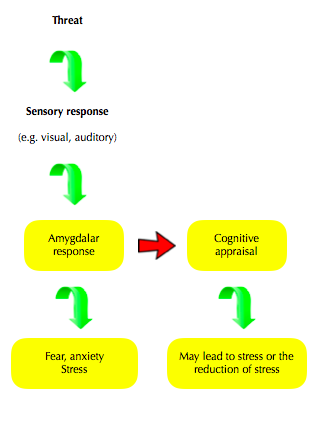Speisman et al (1964)
 Speisman et al (1964) carried out a study to test the theory of cognitive appraisal in emotions. This study is a good example of how cognition can be a mediating factor in the stress response. You could use it to discuss:
Speisman et al (1964) carried out a study to test the theory of cognitive appraisal in emotions. This study is a good example of how cognition can be a mediating factor in the stress response. You could use it to discuss:
- A cognitive approach to one health problem.
- Ethical considerations/research methods in the study of one health problem.
- Ethical considerations/research methods in the cognitive approach
The Transactional Model of Stress argues that it is the interaction of cognitive and physiological responses that lead to how we experience stress. The theory argues that it is the cognitive appraisal of the environmental stressor that leads to an emotional response - or the lack thereof. The theory argues that cognition is a mediating factor in the stress response.
This model also has biological support. Remember that the stress response may begin when we see something that is threatening in some way to us. This information is then sent to the amygdala, which interprets the images and sounds. When it perceives danger, it instantly sends a distress signal to the hypothalamus. LeDoux (2007) argues that the intensity of fear, anxiety and the amygdalar response to stress maybe be mediated by cognition.

The study by Speisman manipulated the cognitive appraisal of a stressful film in order to measure the physiological aspects of the stress response.
The aim of the study was to test the role of cognitive appraisal on the stress response. test the Two Factor Theory of emotion to see if the manipulation of cognitive appraisal would lead to different emotional outcomes.
Two different samples were used in order to make it possible to generalize the findings more broadly. The sample included 56 undergraduate psychology students and 42 middle-level airline executives.
The researchers had participants watch a film of an indigenous circumcision ceremony which involved the cutting of the young boys' genitals. While showing this film, one of three sound-tracks was played.
- The trauma condition: participants could hear the noises of the surgery and they were also told just how painful this surgery is;
- The intellectualization condition: the participants heard a voice-over by an anthropologist explaining the history of the tradition
- The denial condition: the overall tone of the presentation was about the celebration of these young boys becoming men.
There was also a control group in which the film was shown but without sound.
While participants watched the film, researchers measured their heart rate and galvanic skin responses. Immediately after the film was complete, the participants were asked to fill in questionnaires that evaluated the participants’ feelings of stress.
The results showed that the trauma condition showed much higher physiological measures of stress than the participants in the other two conditions. Emotional responses, which were self-reported in the questionnaire, were stronger for those that were in either the control group or the trauma group. The study shows that we gather information from our environment to determine how we react to a situation.
The experiment was highly controlled and thus can infer a cause and effect relationship between the cognitive label and the displayed stress response. The study has high internal validity.
The study is ethically problematic. Watching the video was highly stressful for the participants.
The study is highly artificial and thus lacks ecological validity.
Emotional responses are self-reported and therefore not objectively measured. They are also open to demand characteristics.
The physiological measures and the questionnaire responses were compared using a single blind design in order to eliminate researcher bias.

 IB Docs (2) Team
IB Docs (2) Team
